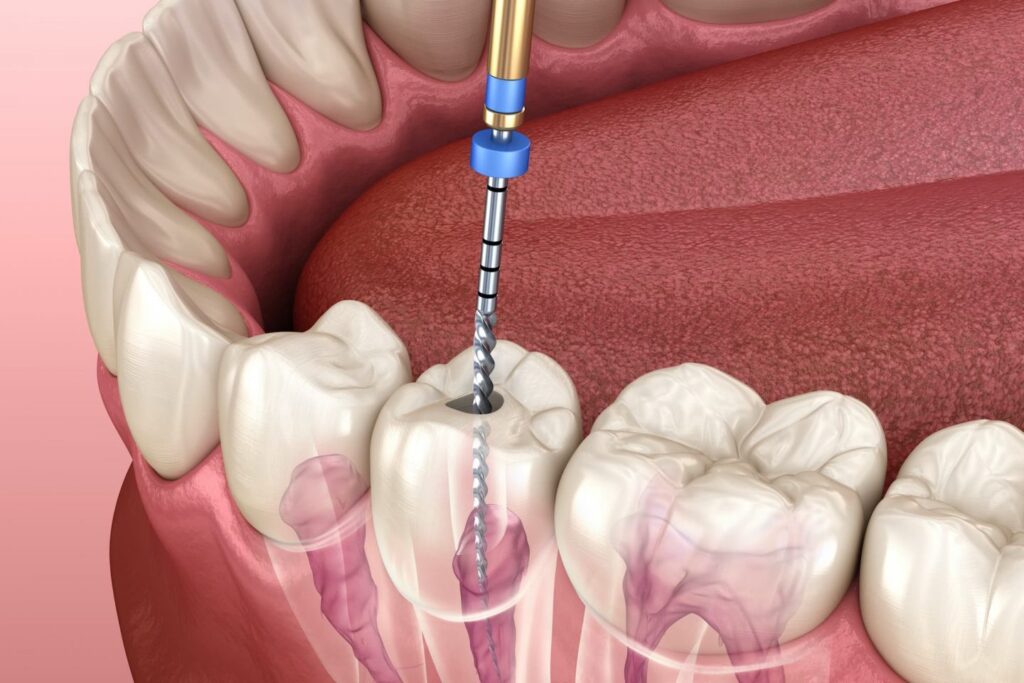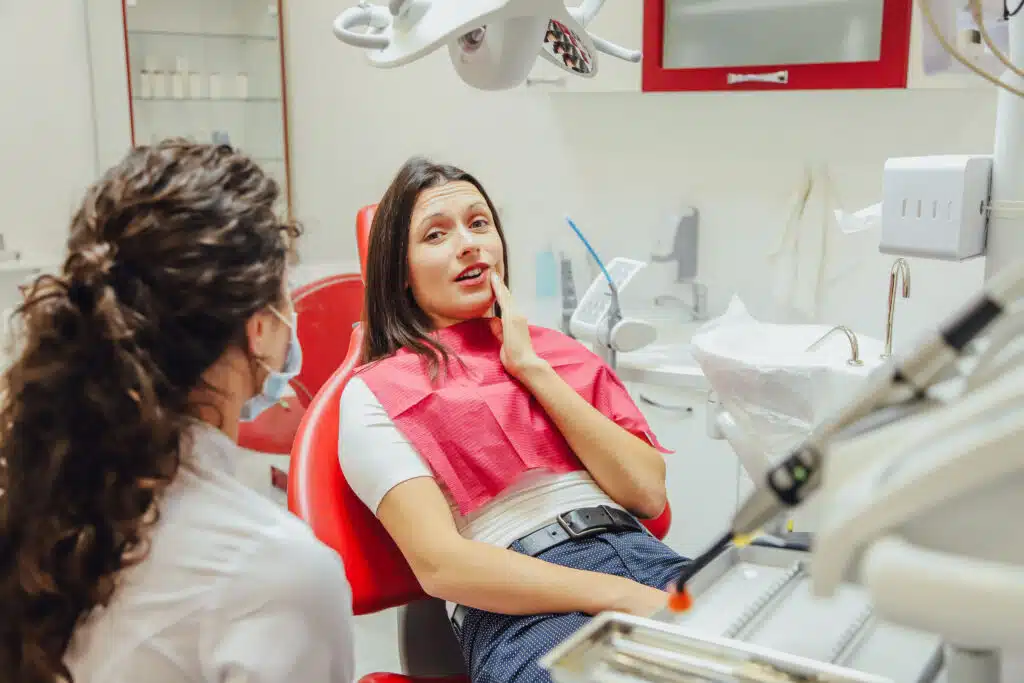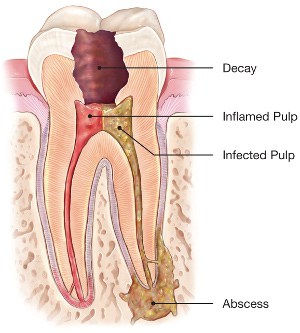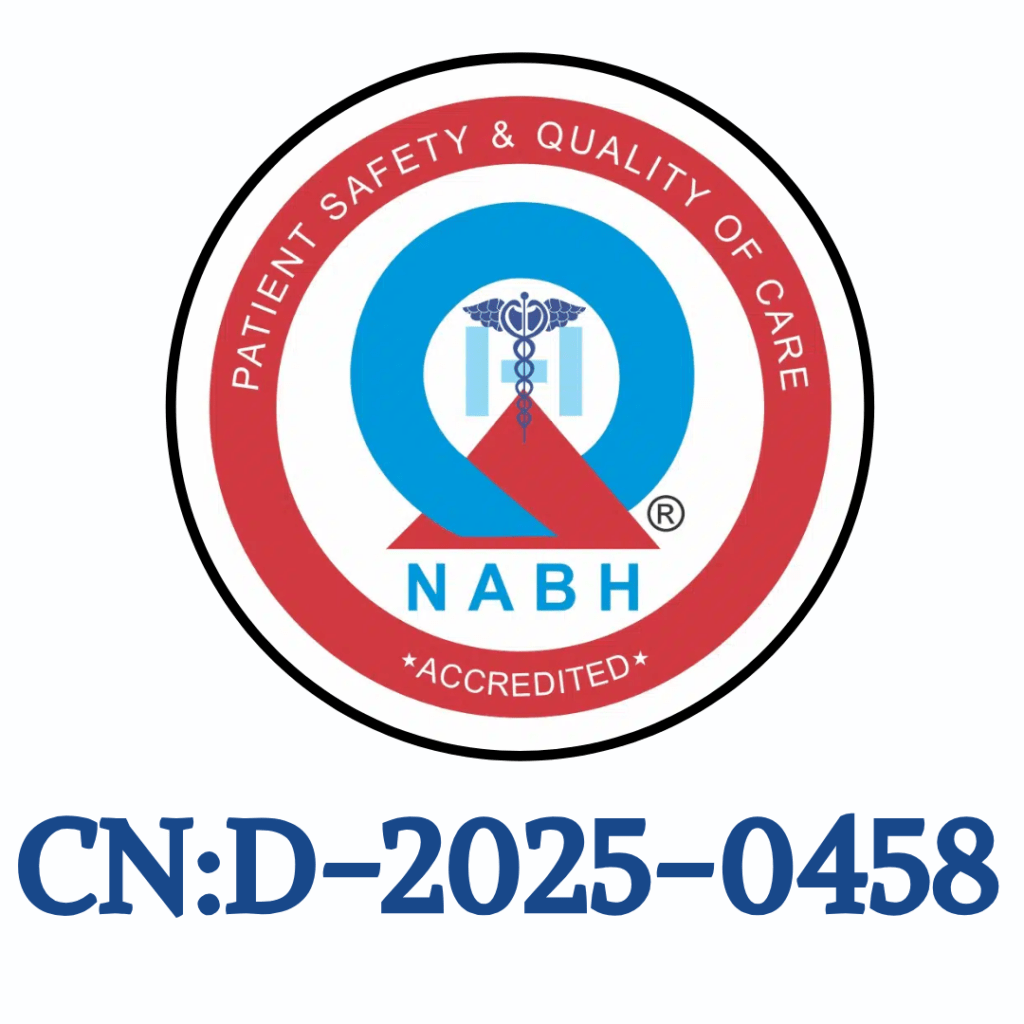WHAT IS DENTAL ROOT CANAL TREATMENT (RCT)?
Dental Root Canal Treatment (RCT) is a crucial procedure offered at V Dental – Gajuwaka, the best dental clinic in Gajuwaka. RCT becomes necessary when the dental pulp, located at the core of a tooth, becomes infected or damaged due to decay or trauma. This treatment, performed by skilled professionals at V Dental, involves the careful removal of the infected pulp, thorough cleaning, and subsequent sealing of the root canals to prevent further infection. The process is crucial in saving a tooth from extraction, restoring its health and function. Patients at V Dental experience top-notch care and expertise, ensuring a comfortable experience with cutting-edge technology. Trust V Dental in Gajuwaka for superior Root Canal Treatment and comprehensive dental solutions. Your smile deserves the best, and V Dental delivers excellence in dental care.






| THE ROOT CANAL TREATMENT (RCT) TYPICALLY INVOLVES THE FOLLOWING STEPS:
Diagnosis: The dentist examines the tooth and takes X-rays to determine the extent of the infection and the shape of the root canals.
Anesthesia: Local anesthesia is administered to numb the affected tooth and the surrounding area, ensuring the patient’s comfort during the procedure.
Isolation: A rubber dam is placed around the tooth to keep it dry and free from saliva during the procedure.
Access Opening: The dentist creates an opening in the tooth’s crown to access the pulp chamber and root canals.
Cleaning and Shaping: The infected or damaged pulp tissue is removed from the pulp chamber and the root canals. The canals are then cleaned, shaped, and disinfected to remove any remaining bacteria.
Medication: An antimicrobial solution may be used to irrigate the canals and eliminate any remaining bacteria.
Filling: The cleaned and shaped root canals are filled with a biocompatible material, often gutta-percha, to seal the space and prevent further infection.
Temporary Filling: A temporary filling may be placed in the access opening to protect the tooth until a permanent restoration can be placed.
Restoration: In many cases, a crown is placed on the tooth to restore its strength and functionality. This step is crucial for teeth that have undergone root canal treatment, as they may become more brittle over time.
It’s important to note that the specific steps and techniques may vary depending on the complexity of the case and the dentist’s preferences. Additionally, advancements in dental technology may influence the procedure’s details. Patients should follow their dentist’s post-treatment care instructions to ensure the success and longevity of the root canal treatment.
| TYPES OF ROOT CANAL TREATMENT (RCT)?
Conventional Root Canal Treatment (RCT): This is the standard and most common type of root canal treatment. It involves cleaning, shaping, and filling the root canals to treat infection or damage.
Single-Visit Root Canal Treatment: In some cases, the entire root canal procedure can be completed in a single visit to the dentist. This is often possible when the infection is not too extensive, and the tooth is relatively straightforward to treat.
Endodontic Retreatment: If a previously treated tooth exhibits signs of infection or a new problem arises, the dentist may need to perform a retreatment of the root canal. This involves reopening the tooth, removing the existing filling, and addressing any issues that may have arisen since the initial treatment.
Apicoectomy: In cases where conventional root canal treatment has not been successful or is not feasible, an apicoectomy may be considered. This involves the removal of the tip of the tooth’s root and surrounding infected tissue.
Pulpotomy: This is a partial root canal treatment where only the infected or damaged pulp in the crown (top part of the tooth) is removed. It is often performed in children on primary (baby) teeth.
Regenerative Endodontics: This is an emerging field that aims to restore the health of the dental pulp and promote the regeneration of damaged tissues inside the tooth. It’s typically used in cases involving immature teeth with underdeveloped roots.
The choice of the specific type of root canal treatment depends on factors such as the severity of the infection, the tooth’s location, and its overall condition. Dentists will evaluate each case individually to determine the most appropriate approach.
FAQ
Most frequent questions and answers
RCT is a dental procedure aimed at treating infections or damage to the dental pulp (innermost part of the tooth). It involves cleaning, shaping, and filling the root canals to save a tooth that might otherwise need extraction. It is needed when the pulp becomes infected due to deep decay, trauma, or other dental issues.
Modern dental techniques and anesthesia make the procedure relatively comfortable for patients. The dentist will administer local anesthesia to numb the tooth and surrounding area, ensuring that you do not feel pain during the treatment. After the procedure, there might be some discomfort, but it can usually be managed with over-the-counter pain medication.
The duration of a root canal treatment can vary depending on factors such as the tooth’s location, anatomy, and the extent of the infection. In many cases, a single-visit procedure can take about 1 to 2 hours, while more complex cases might require multiple visits.
In most cases, it is safe to drive home after a root canal treatment. However, if you have received sedation or if you feel lightheaded or drowsy after the procedure, it’s advisable to arrange for someone to drive you home.
The success rate of root canal treatment is generally high. Success depends on various factors, including proper cleaning and sealing of the root canals, the tooth’s restoration (such as placing a crown), and maintaining good oral hygiene. Your dentist will provide post-treatment care instructions to maximize the chances of success.


